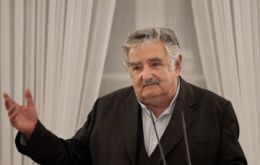MercoPress. South Atlantic News Agency
Tag: Uruguay
-
Friday, October 28th 2011 - 04:56 UTC
IDB loan to promote tourism destinations and activities along the River Uruguay

The Inter-American Development Bank (IDB) approved a loan for 5 million dollars to promote tourism in six Uruguayan departments with the aim of boosting foreign exchange earnings, income, and employment.
-
Thursday, October 27th 2011 - 23:16 UTC
Uruguay passes bill eliminating prescription of crimes against humanity

The Uruguayan Congress passed early Thursday a law that eliminates the effects of the 1986 Amnesty Law (also known as Expiry Law), which protected police and military personnel from being prosecuted for human rights violations, and repeals a statute of limitations that would have prevented victims from filing criminal complaints as of 1 November.
-
Thursday, October 27th 2011 - 05:52 UTC
In anticipation of global crisis World Bank extends 260m loan to Uruguay

The World Bank Board approved a 260 million dollars loan to support the Uruguayan government’s reform program in order to consolidate growth with social equity and provide a line of financing to address the impact of the current uncertainty in global economic affairs.
-
Thursday, October 27th 2011 - 05:47 UTC
Uruguay’s flock at a historic low; number of cattle below 11 million

The latest update of Uruguay’s livestock census for the year ending last June 30 shows the number of cattle is below eleven million and the flock at its lowest since colonial times with 7.3 million head.
-
Thursday, October 27th 2011 - 05:40 UTC
Uruguay anticipates 230 cruise calls this season from November to May

Uruguay expects a record cruise season beginning November with over 230 calls split between Montevideo and Punta del Este, 80 miles to the east on the Atlantic coast line, according to Deputy Tourism minister Lilian Kechichián.
-
Wednesday, October 26th 2011 - 16:35 UTC
Good reception for Uruguay’s offshore hydrocarbons seismic data

Uruguay’s oil and gas refining corporation, Ancap, reported it has sold seismic data on the country’s continental shelf hydrocarbons potential for the value of 20 million dollars which more than covers the costs involved in the several surveying operations.
-
Tuesday, October 25th 2011 - 19:45 UTC
Crises in the US and Spain have Uruguayans returning in growing numbers

Uruguayan expatriates are returning at an average of 350 per month which is three times the 2010 rate, but his only refers to those that have formally requested advice and assistance from the country’s Foreign Affairs ‘Return and Welcome Office’.
-
Tuesday, October 25th 2011 - 18:50 UTC
EIU expects higher inflation in Uruguay as government tries to spur growth

The Uruguayan government will concentrate efforts in promoting economic growth, (debilitated in the second quarter), plus reducing domestic debt, even to the expense of “weakening the credibility of the inflation target”, according to the Economist Intelligence Unit, EIU, from The Economist magazine.
-
Monday, October 24th 2011 - 06:41 UTC
Philip Morris shuts down plant in Uruguay because of anti-smoking policies

The US tobacco giant Philip Morris said on Friday it shut down its plant in Uruguay because the country's anti-smoking policies make business unprofitable.
-
Friday, October 21st 2011 - 08:35 UTC
In Uruguay we have learnt to bury the old economic paradigms, says Mujica

Uruguay’s strategy is to attract foreign private investors and offer the necessary guarantees to develop their business, said President Jose Mujica in a brief summary of his ten day European visit of four countries and the headquarters of the European Union in Brussels.
